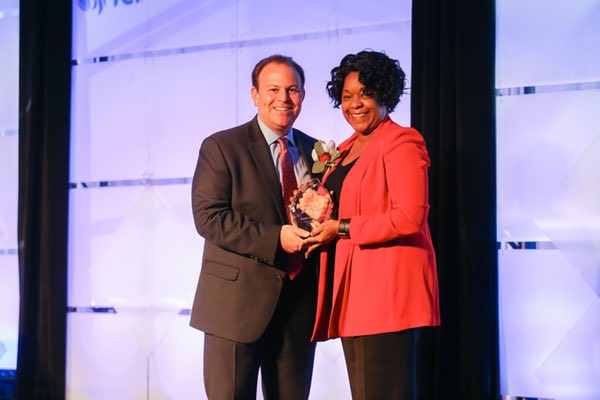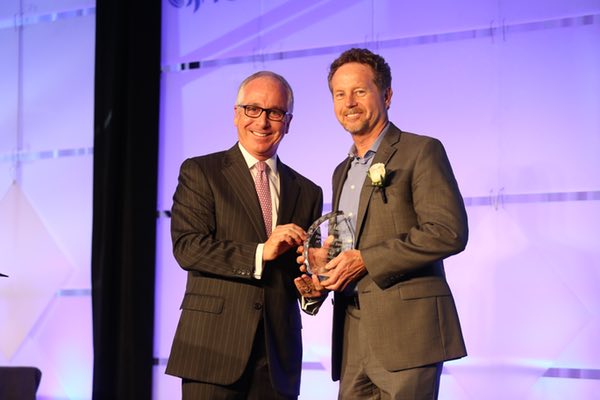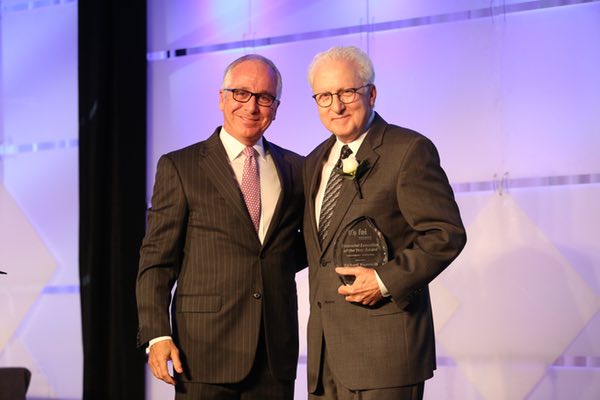Paula Gold-Williams, President & Chief Executive Officer of CPS Energy

Finance has been a universal communicating tool for Gold-Williams, President and Chief Executive Officer, CPS Energy, and has allowed her to jump industries and roles.
Paula Gold-Williams’ financial foundation has served her well throughout her career, from CPA to CEO.
“One of the reasons why I was really excited about the award this year is that I want to show people that even if you're a financial person, and maybe even more so because you're a financial person, the opportunities are broader than they've ever been. An accountant running an engineering analytics firm is never lost on me and I think the reason I can do it, and why people behind me can do it, is because when you're a finance person, you think about the business model. You think about the value propositions. You think about the impact of financial allocation of resources, and what it does for you in the short term and the long term.”
Gold-Williams has used her finance background to always keep her fiduciary responsibility to the company in mind. Over her 12 years at CPS Energy, she has served as Controller and Assistant Treasurer, Executive Vice President, Chief Financial Officer, President & Chief Executive Officer, to name a few.
Throughout her career, Gold-Williams was always able to rely on the skills she began developing as a CPA. “I continue to be a champion of finance, to be a good steward of your resources. It served me over and over again. I could move back and forth from financial to non-financial responsibilities, and I could make it make sense to the average person.”
Lenora Hardy-Foster, CEO of the Judson Center

Lenora Hardy-Foster made the transition from CFO to CEO last year, fulfilling a career-long dream of becoming the CEO of a non-profit. For her the transition was seamless, thanks to her determination and deep passion for non-profits.
Hardy-Foster began her career as a senior accountant and, over the years, was promoted to Director of Finance, to Vice President and Administration at which point she started taking on other responsibilities in order to broadened her knowledge in the areas of human resources, information technology, and facilities management. Those skills, combined with a deep understanding of the financial operations of the company led to a promotion to Executive Director and CFO of Southwest Solutions.
A little over a year ago Hardy-Foster was approached by a headhunter (an opportunity that came through FEI) about the CEO position at Judson Center. “I’ve always had the ambition to one day become the CEO of a non-profit organization. I have a passion for being a part of a company that’s really making an impact on peoples’ lives and helping to improve communities.”
Hardy-Foster’s advice to the younger generation of finance is to have patience. “If I want to be CFO, it may take me 20 years to get there. What I see in younger generations is they come in the door and they see themselves as CFOs tomorrow. At times, they lose sight of the knowledge and expertise. They want to go so quickly, that they miss parts of the job.”
Mike Love, VP and CFO, Climax Portable Machine Tools, Inc

An effective financial leader has the ability to bring the numbers to life, especially for those who have little appreciation for financial statements. This is a skill that Mike Love, Vice President, Chief Financial Officer, Secretary and Treasurer, Climax Portable Machine Tools, prides himself on. And just as important as having the tools to communicate complicated financial information, is having a strong understanding of the business. To Love, a financial leader engages in the entire organization, not just the financial aspects. “A financial person is basically a reporter and a compliance officer. But I want to minimize it to the extent I can so that I can spend my time out in the business.”
Being a strong leader in finance is all about balance for Love. “You can't become a CFO without some level of technical skill. But you can't become a great CFO without the soft skills.”
His drive, combined with rich experiences, has led him to become a well-rounded CFO with that difficult to attain balance of technical and critical thinking skills. Love’s roles have spanned the globe, giving him multi-faceted domestic and international leadership experience. At Climax Portable Machine Tools, Michael was a member of the Executive Team that successfully orchestrated the sale of the Company to new private equity owners, and acquired three complimentary companies. Love was always focused on his ultimate goal: to become a CFO, and he looks for that same drive when hiring young finance professionals.
“Without the goal orientation, it’s like pulling out a map without a destination. I think a lot of people have a more difficult time gaining the requisite skills that they're going to need because, without that direction, you can stray from the path quite often.”
Gordon Heneweer, CFO, CooperVision, Inc.

Gordon Heneweer believes in developing talent, which includes being precise and diligent about getting the correct mix of technical and soft skills in his financial team at soft contact lens manufacturer CooperVision.
“Sometimes as a profession we don’t a very good job on how to lead and inspire people in an organization where they become part of a leadership team as a trusted adviser and not just a number cruncher,” he explains. “You need somebody that has a vision and that can provide leadership to a team.”
Heneweer joined CooperVision as Chief Financial Officer in September 2011. Prior to joining CooperVision, he served as Vice President of Finance, as well as Interim Chief Financial Officer for Electronics for Imaging, Inc., a global leader in digital print management products and solutions.
"I would say that building the organization and developing the organization is a big part of my responsibility," Heneweer explains. "We do a review of the entire organization from a development and capabilities standpoint, trying to identify the true future leaders of the organization using kind of a nine box grid and plotting where these individuals are. The majority of people typically land in the middle but we always have the few that fall into the category of the high performing, high potential people. And those are the people that we really kind of single out. They're going to be the future leaders of the company and the future."
Richard D. Naponelli, Chief Financial Officer, Vice President (Retired), Sage Products LLC

Although he recently retired, Richard D. Naponelli made his mark during his tenure as Chief Financial Officer, Vice President Sage Products LLC.
An integral part of the recent sale of Sage Products to Stryker Medical, Naponelli built an operational infrastructure that sustained revenue growth from $13 million in 1986 to currently over $500 million while also building a dedicated professional staff with an average tenure of 17 years.
Naponelli says that the team he build while at Sage was key to his success as a leader.
“Nothing really happens in an organization without building a quality staff,” he says. "They are going to execute the plan.”
Although the priority for anyone on Naponelli’s team is technical financial and accounting prowess, interpersonal skills quickly becomes the attribute that become a differentiator.
"You can train the technical side of the business, but you can’t train someone’s interposal skills,” he explains, “You need to stay ahead to the curve from a regulator standpoint and from a professional standpoint you need to decant your knowlwebase. I've been blessed with good mentoring, and I’ve learned the key to leadership. There are two factors that I learned that changed me as far as a leader. Number one is empathy, and number two is humility.”
